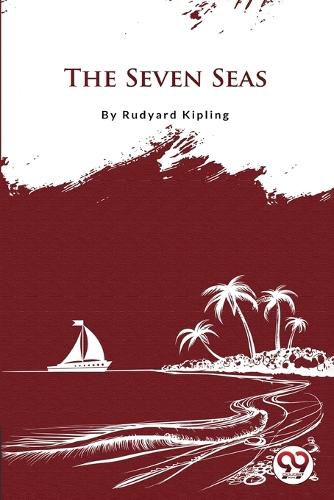Readings Newsletter
Become a Readings Member to make your shopping experience even easier.
Sign in or sign up for free!
You’re not far away from qualifying for FREE standard shipping within Australia
You’ve qualified for FREE standard shipping within Australia
The cart is loading…






This title is printed to order. This book may have been self-published. If so, we cannot guarantee the quality of the content. In the main most books will have gone through the editing process however some may not. We therefore suggest that you be aware of this before ordering this book. If in doubt check either the author or publisher’s details as we are unable to accept any returns unless they are faulty. Please contact us if you have any questions.
'The Seven Seas' is a book of poetry by Rudyard Kipling printed in 1896. The Seven Seas was one of Rudyard Kipling's accomplishments. Its poems effect the promise of the title page promoting a stormlashed, oilskin-clad sailor at the wheel. This was Kipling's first poetry collection since the smash hit 'Barrack Room Ballads' of 1892. It is splitted into two sections: 20 of the 34 poems in the first half are directly concerned with ships, sailors, and all but five of the others deal with the related topics of travel, communications technology and connections across space and/or time while further 'Barrack Room Ballads' conclude with the homeward-bound soldier of 'For to admire' considering an amazingly calm 'Injian Ocean'. The main theme of The Seven Seas is the global range of the British Empire, its regions divided by thousands of miles of salt water yet consolidated by the ships of the Royal Navy, the merchant fleet and the liners carrying their travellers between the continents. Numbers 1-25 are separate poems, all linked by the ideas of the sea and more or less specifically the British Empire. 'A Song of the English' is the longest poem, at around 20 pages. The Seven Seas celebrates British imperialism. It is a sharp, disenchanted series of poems centred on Britain's role in colonialism and Empire building with reverberations and powerful imagery.
$9.00 standard shipping within Australia
FREE standard shipping within Australia for orders over $100.00
Express & International shipping calculated at checkout
This title is printed to order. This book may have been self-published. If so, we cannot guarantee the quality of the content. In the main most books will have gone through the editing process however some may not. We therefore suggest that you be aware of this before ordering this book. If in doubt check either the author or publisher’s details as we are unable to accept any returns unless they are faulty. Please contact us if you have any questions.
'The Seven Seas' is a book of poetry by Rudyard Kipling printed in 1896. The Seven Seas was one of Rudyard Kipling's accomplishments. Its poems effect the promise of the title page promoting a stormlashed, oilskin-clad sailor at the wheel. This was Kipling's first poetry collection since the smash hit 'Barrack Room Ballads' of 1892. It is splitted into two sections: 20 of the 34 poems in the first half are directly concerned with ships, sailors, and all but five of the others deal with the related topics of travel, communications technology and connections across space and/or time while further 'Barrack Room Ballads' conclude with the homeward-bound soldier of 'For to admire' considering an amazingly calm 'Injian Ocean'. The main theme of The Seven Seas is the global range of the British Empire, its regions divided by thousands of miles of salt water yet consolidated by the ships of the Royal Navy, the merchant fleet and the liners carrying their travellers between the continents. Numbers 1-25 are separate poems, all linked by the ideas of the sea and more or less specifically the British Empire. 'A Song of the English' is the longest poem, at around 20 pages. The Seven Seas celebrates British imperialism. It is a sharp, disenchanted series of poems centred on Britain's role in colonialism and Empire building with reverberations and powerful imagery.